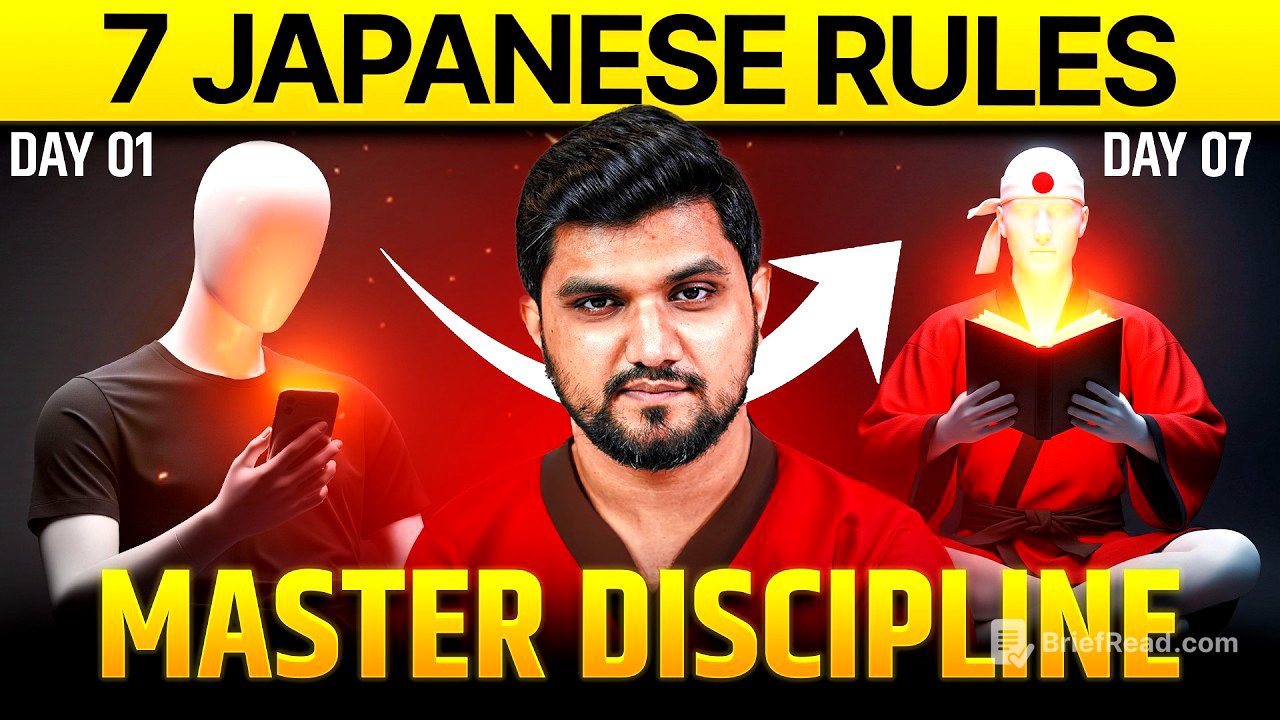TLDR;
This video presents seven Japanese philosophies aimed at fostering a strong mindset and achieving success. It emphasizes the importance of embracing discomfort, finding purpose, pursuing excellence, accepting the uncontrollable, appreciating imperfection, continuous improvement, and decluttering one's life. The video encourages viewers to apply these principles practically, starting with a single principle for seven days to experience tangible transformation.
- Shugyo: Embrace discomfort for inner strength.
- Ikigai: Find your purpose to fuel enthusiasm.
- Kodawari: Pursue excellence in every detail.
- Shikata Ga Nai: Accept what you cannot control.
- Wabi Sabi: Appreciate imperfection.
- Kaizen: Commit to daily improvement.
- Danshari: Declutter to discover your true self.
What are these philosophies or principals? [0:00]
The video introduces seven Japanese philosophies designed to help individuals excel. Japan's resilience despite facing numerous disasters and economic challenges is attributed to its strong mindset, rooted in these ancient philosophies. These principles can transform ordinary individuals into disciplined individuals, offering a system for living that promotes personal growth and clarity.
The first principal - Shugyo [2:08]
Shugyo, or ritual suffering, involves deliberately embracing discomfort to build inner strength. Unlike the modern tendency to avoid discomfort, Shugyo views pain as a form of practice. Discipline is key to overcoming comfort, exemplified by figures like Miyamoto Musashi, who practiced both swordsmanship and calligraphy to cultivate discipline. To incorporate Shugyo, one should deliberately seek discomfort, such as taking cold showers or exercising regularly, which can set you ahead of most people.
The second principal - Ikigai [4:39]
Ikigai is one's purpose or reason for waking up with enthusiasm each morning. It provides direction to discipline and transforms routine into a meaningful ritual. Dr. Shigeaki Hinohara, the world’s longest-serving physician, exemplified Ikigai by working tirelessly into his old age because he felt he had much to give to the world. Finding and pursuing one's Ikigai is essential for sticking to goals and preventing frustration.
The third principal - Kodawari [6:00]
Kodawari represents the relentless pursuit of excellence in even the smallest details. It complements Ikigai by providing the "how" to one's purpose. Jiro Ono, the Sushi Master, exemplifies Kodawari by dedicating himself to perfecting every aspect of sushi making, earning him three Michelin stars. Applying Kodawari involves mastering new tools and technologies and focusing on small details to achieve excellence.
The fourth principal - Shikata Ga Nai [7:50]
Shikata Ga Nai translates to "it cannot be helped" and teaches acceptance of things outside one's control. This principle emphasizes emotional clarity and saving energy by focusing on what can be controlled. The response of the Japanese people to the 2011 tsunami, where they calmly cleaned up without frustration, exemplifies Shikata Ga Nai. Applying this principle involves avoiding stress over uncontrollable events and focusing on self-improvement.
The fifth principal - Wabi Sabi [9:19]
Wabi Sabi is the appreciation of imperfection, highlighting that even broken things can be valuable. The Japanese tradition of Kintsugi, repairing broken bowls with gold or silver to highlight the cracks, exemplifies this philosophy. It encourages individuals to embrace their imperfections and not let the pursuit of perfection prevent them from starting tasks. Balancing the chase for excellence with acceptance of imperfection is key to enjoying life.
The sixth principal - Kaizen [10:32]
Kaizen means daily improvement through small, consistent changes. A worker on Toyota’s assembly line who identified a way to save four seconds per car door exemplifies this principle. This small change resulted in significant savings in time and money. Applying Kaizen involves habits like reading, even just a few pages a day, to bring about daily improvement.
The seventh principal - Danshari [11:46]
Danshari involves letting go of what you don’t need to discover who you really are. Inspired by Hideko Yamashita's work with a woman overwhelmed by clutter, Danshari emphasizes decluttering one's life to calm the mind and focus on what truly matters. Fumio Sasaki's "Goodbye, Things" reinforces that less material possessions lead to more clarity. The video encourages viewers to pick one of the seven principles and consistently apply it for seven days, promoting a focused approach to self-improvement.









